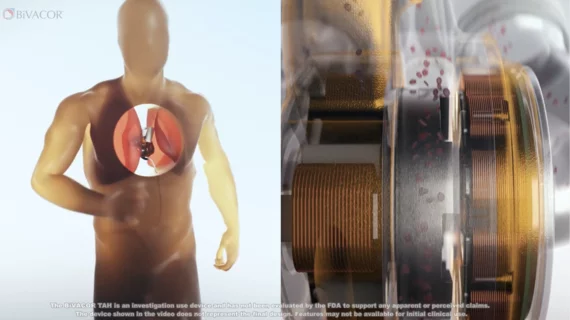FDA approves early feasibility study for total artificial heart technology
BiVACOR, an international medical device company with headquarters in the United States and Australia, has received approval from the U.S. Food and Drug Administration (FDA) to kick off an early feasibility study (EFS) for its total artificial heart (TAH) technology.
The BiVACOR Total Artificial Heart is intended to be a bridge for heart failure patients waiting to receive a full heart transplant. The device, based on rotary blood pump technology, is approximately the size of an adult’s fist. While it was designed to support an adult male who is actively exercising, it is also small enough that women and some pediatric patients could potentially receive the device.
According to BiVACOR, the TAH uses the same technology seen in high-speed trains. Its only moving part is a magnetically suspended double-sided centrifugal pump impeller. The device’s non-contact suspension has two primary benefits: limiting blood trauma to prevent hemolysis and reducing the risk of mechanical wear.
The first-in-human EFS is expected to begin in 2024, enrolling three patients at first. The company’s hope is that data from the EFS will set the stage of a U.S. pivotal study.
“The implantation of a TAH system is a potential treatment option for patients with heart failure who need support while on the heart transplant waiting list and for those who do not qualify for a transplant,” Joseph Rogers, MD, CEO of the Texas Heart Institute, said in a statement. The Texas Heart Institute is one of ten hospitals available to participate in the EFS if needed. “The BTAH is designed to replace the function of the native heart completely. It is an impressive technology, and I am excited to see the potential of BTAH in treating patients with severe heart failure.”
“We believe this study will build upon the already successful pre-clinical data we have and is expected to set up 2024 as a significant year of milestones for BiVACOR as we continue to build our database of evidence,” added Daniel Timms, PhD, founder and chief technology officer of BiVACOR. “I am incredibly proud of the unwavering hard work and dedication from our team and network around the globe for achieving this pivotal landmark in the clinical development of our TAH system.”
The BiVACOR TAH technology is not yet approved for use. This initial EFS will focus on patients with biventricular heart failure, but future research will explore its potential in larger patient populations.

